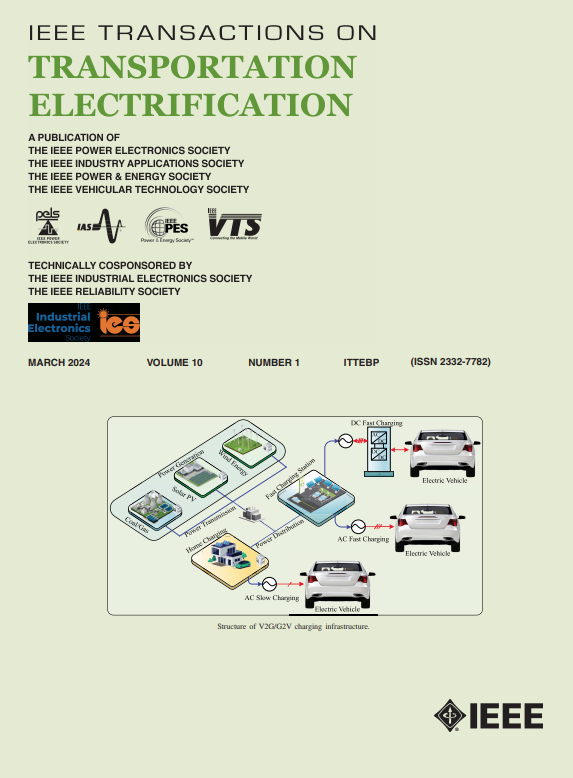基于深度强化学习的耦合配电和闪充公共交通系统双时标电压调节
IF 8.3
1区 工程技术
Q1 ENGINEERING, ELECTRICAL & ELECTRONIC
IEEE Transactions on Transportation Electrification
Pub Date : 2024-12-17
DOI:10.1109/TTE.2024.3519215
引用次数: 0
摘要
受电弓充电器是电动巴士最有前途的充电解决方案之一,具有全自动高功率充电功能,可以满足巴士站的电动巴士闪充。通过“少收费,多收费”,可以大大提高电子商务的技术可行性和经济竞争力。然而,这样的收费安排不可避免地威胁到配电网络(DNs)的安全运行,这已经因不断增长的可再生能源而变得复杂。因此,本文提出了一种数据驱动的双时间尺度电压调节方法,以解决耦合配电和闪充公共交通系统(CDFPTSs)的运行挑战。具体而言,远程控制开关(rcs)和软开路点(sop)都具有优化潮流分配的“阀门”功能,由多个智能代理协调,从根本上增强了受到突然和过量充电需求影响的电压安全性。由于rcs和sop的运行时间尺度不同,本文专门设计了一个双时间尺度的马尔可夫博弈,实现对agent的无模型和分散控制,从而加快决策速度,减少通信依赖。为了有效地处理rcs和sop的混合动作空间,保证它们的操作约束,更重要的是,减少双时间尺度学习中出现的非平稳问题,进一步提高调节性能,提出了一种动作持久性多智能体软行为评价(AP-MASAC)算法。数值结果表明,AP-MASAC可以在CDFPTS的电压调节任务中优于各种基准,特别是在以数据驱动的方式缓解电压违例方面。本文章由计算机程序翻译,如有差异,请以英文原文为准。
Two-Timescale Voltage Regulation for Coupled Distribution and Flash-Charging-Enabled Public Transit Systems Using Deep Reinforcement Learning
As one of the most promising charging solutions for electric buses (EBs), the pantograph charger features fully automated high-power charging, allowing it to cater to EB flash charging at bus stops. By “charging less but more often,” the technical viability and economic competitiveness of EBs can be greatly enhanced. However, such a charging arrangement inevitably threatens the secure operation of distribution networks (DNs), which is already complicated by the growing renewables. Hence, this article proposes a data-driven two-timescale voltage regulation method to tackle the operation challenge in coupled distribution and flash-charging-enabled public transit systems (CDFPTSs). Concretely, remotely controlled switches (RCSs) and soft open points (SOPs), both functioning such as “valves” to optimize power flow distribution, are coordinated by multiple intelligent agents to essentially enhance voltage security heavily impacted by abrupt and excess EB charging demand. Due to the different operation timescales of RCSs and SOPs, a two-timescale Markov game is dedicatedly formulated to enable a model-free and decentralized control of agents for accelerating decision-making and reducing communication reliance. An action-persistence multiagent soft actor-critic (AP-MASAC) algorithm is proposed to effectively handle the hybrid action space of RCSs and SOPs, ensure their operational constraints, and, more importantly, mitigate nonstationary issues appearing in two-timescale learning to further boost regulation performance. Numerical results reveal that AP-MASAC can outperform various benchmarks in voltage regulation tasks for the CDFPTS, especially in relieving voltage violations in a data-driven manner.
求助全文
通过发布文献求助,成功后即可免费获取论文全文。
去求助
来源期刊

IEEE Transactions on Transportation Electrification
Engineering-Electrical and Electronic Engineering
CiteScore
12.20
自引率
15.70%
发文量
449
期刊介绍:
IEEE Transactions on Transportation Electrification is focused on components, sub-systems, systems, standards, and grid interface technologies related to power and energy conversion, propulsion, and actuation for all types of electrified vehicles including on-road, off-road, off-highway, and rail vehicles, airplanes, and ships.
 求助内容:
求助内容: 应助结果提醒方式:
应助结果提醒方式:


